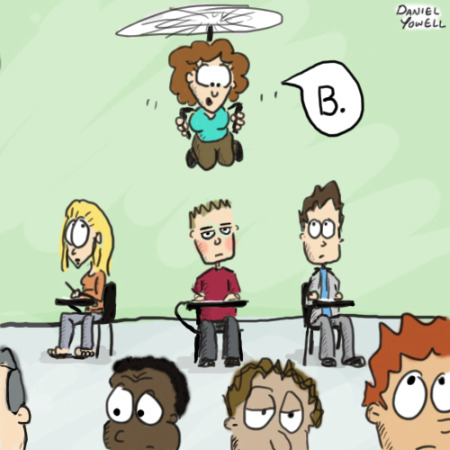These days, raising a child can seem like directing a toy truck through a minefield. Parents are forced to consider dangers now that were unheard of in the 80s and 90s, and competition is intense. A bad day on the SAT could cost thousands in lost scholarships or missed opportunities, and a resume not bursting with experience and internships is often the difference between a call-back interview and unsettling silence.
Yet even in this new hostile climate, some parents can take their duties too seriously. Affectionately dubbed “helicopter parents” for the way they “hover” carefully above and around their progeny, these adults have been known to organize their children’s schedules, fill up their free time with extracurricular activities, and even complete assignments or research papers for them.
These parents are not only totally available to their kids, they also push their children to achieve. In an article for Psychology Today, Margaret Nelson points out that kids of helicopter parents are more likely to achieve success in school than their peers: “In fact, the National Survey of Student Engagement found that children of helicopter parents reported more satisfactory college experiences and gained more in areas of critical thinking and writing than did those whose parents were less likely to hover.” Despite their failings, overinvolved parents are successful, at least regarding academic achievement.
It should be noted, however, that many of the correlations discovered by the National Survey of Student Engagement may result from background factors. Helicopter parents, after all, tend to share elite status. That means their kids often go to great high schools and enjoy financial stability, two things that would facilitate classroom achievement anyway. When elite households are fretting over a B+ and special summer programs, lower income households are worrying about quality of education and keeping their children physically safe. Perhaps ultra hands-on parenting is merely the mixture of affluence and compassion.
Even so, university administrators believe that this group takes their responsibilities too far, which may have deleterious effects on student development. For instance, children of overinvolved parents are more likely to be more dependent, less open, and more neurotic than their peers, according to a study conducted at Keene State College. Even if kids attend better schools and benefit more from their education, these qualities can be impediments to a successful professional life.
Barry Glassner and Morton Schapiro, presidents of Lewis & Clark College and Northwestern University, respectively, recently contributed an article to the Washington Post, which prescribed a treatment, of sorts, for parents falling into this category: “The antidote to excessive parental involvement is constructive engagement — a way for parents to stay meaningfully involved with their children during this new phase in their growth,” they said. In other words, college is an opportunity for parents to show support from the sidelines instead of rushing onto the field whenever a foul is called. Often, students benefit from being pushed to take difficult classes or to explore fields outside their experience. These are ways of channeling the parenting impulse through productive channels.
Parental hovering units do a great job in secondary school. They have responded to a number of new pressures in accordance with their ability and resources. However, they can also learn how to become even more beneficial to their college-bound children by learning when and where to pull back.

